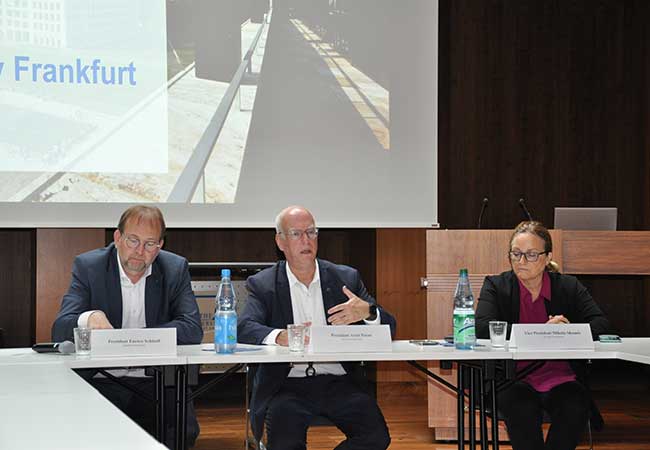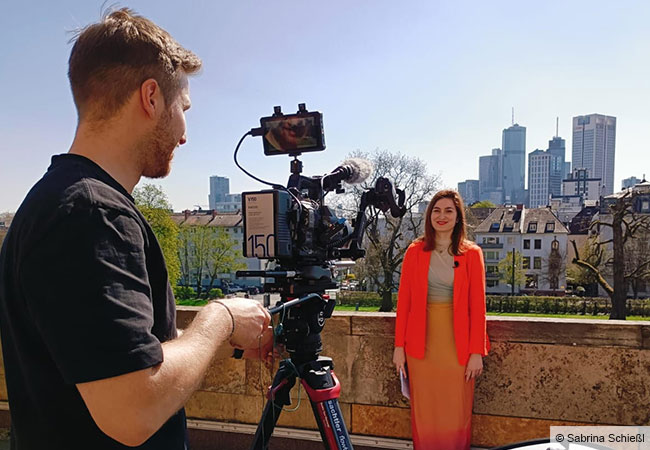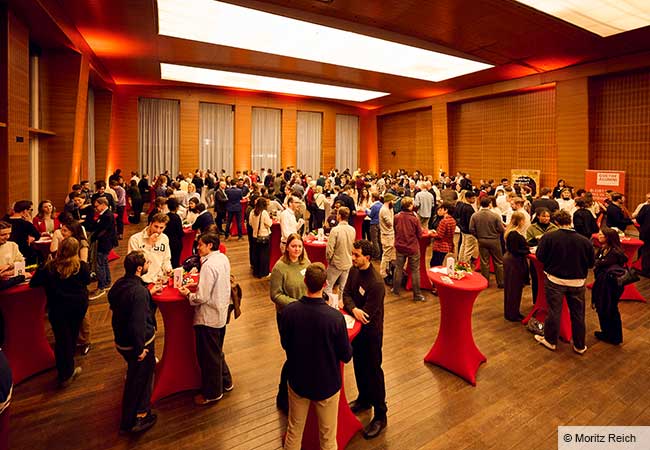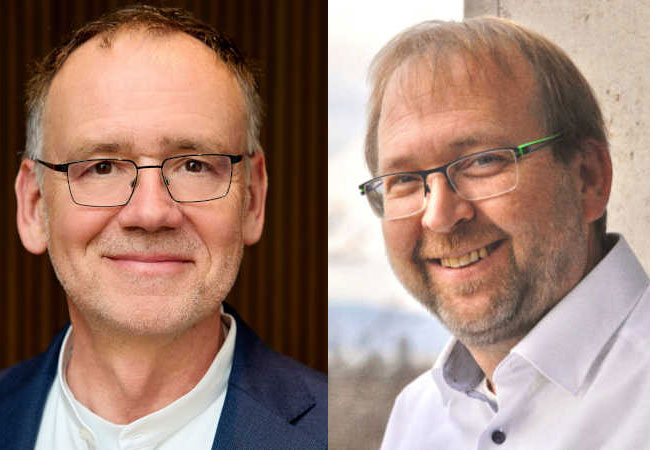Discussions with President Ariel Porat and Vice President Milette Shamir focus on Israeli academia post-October 7

What is it like to operate as a university in Israel after the brutal October 7 attacks? How do international calls for academic boycott, the devastations of the military intervention in Gaza and the Netanyahu government’s proposed changes in the hitherto democratic system influence academia in Israel? Prof. Ariel Porat and Prof. Milette Shamir, president and vice president international at Tel Aviv University respectively, used the occasion of a visit to Goethe University to share their experiences with council members, senators and faculty deans.
Welcoming the participants, Goethe University president Prof. Enrico Schleiff focused on the challenges faced by universities in Israel now to serve the needs of society. He recalled the long partnership between the two institutions, emphasizing the growing scientific exchange based on mutual trust. Plans for a common center for neuroscience, Schleiff reminded participants, were interrupted by the shocking events of October 7 and currently delayed to allow the colleagues in Israel to tend to more pressing matters.
“This discussion is happening at a time when it seems as though the world has turned its back on Israel. That is not the case for Germany,” Schleiff said, extending the regards of Germany’s U15 [the association of fifteen leading German universities with a strong research tradition] and the German Rectors’ Conference [Hochschulrektorenkonferenz] representing Germany’s higher education and research sector. “All institutions and researchers in Germany stand behind Israel, even if the discussions can be hard and painful,” he continued, adding that “we stand for academic freedom and freedom of speech, but we have to ensure that this takes place within the framework of scientific action and rules and does not cross into racism and antisemitism.” Addressing Porat and Shamir, he conveyed the message of the entire university: “We stand with you.”
Prof. Ariel Porat thanked Prof. Schleiff for the warm welcome. “This is one of the hardest times in the history of Israel, it really is one of emergency, and it is good to know that you have friends like these.” October 7, he said, “is definitely the most terrible event that has happened to the Jewish people in their own country.” That is why the attitude of university presidents in Germany is so encouraging and moving, Porat said.
The university and civil society: TAU in the immediate aftermath of October 7
The TAU president recalled that “I was on a fundraising mission in Australia on October 7, and upon hearing the news immediately returned to Israel. The first thing I did here was to visit the families of TAU students who had lost their lives. After that, I traveled to affected communities bordering Gaza with members of our faculty of medicine, who were asked to come. We visited places that were closed to the public then. It was just a few days after the disaster, you still had the smells, the sights of children’s toys scattered around. Everything was still there and it was really shocking.” Beyond coming to meet the people, the reason he visited was to see how TAU could help.
The law professor, who has been TAU president since 2019, said Israeli civil society really excelled in the aftermath of that day, including TAU, which was among the first entities to send volunteers to help in agriculture. “40% of the agricultural product of Israel is produced in the communities bordering the Gaza Strip and all the foreign employees immediately left. There was no one to cultivate the land. So we sent faculty and staff to help. We also helped schools and kindergartens from the south and the north of Israel, and many members of the psychology, social work and medicine faculties volunteered in different capacities to work with the injured, their families, and others.”
TAU is Israel’s largest university, with 30,000 students. Of these, 7,000 were drafted following October 7. “All told, about one-third of our students were called up,” Porat said. As an immediate response, the university established an emergency fund to provide assistance to them and their families. In addition, it quickly went to work implementing existing plans for a post-trauma center, which had been due to be formally inaugurated in 2026. Since opening its doors on January 1, 2024, more than 1,000 people have registered.
With so many of its students on military duty, TAU postponed the beginning of the academic year by two months. The main issue for all universities and colleges in Israel was to enable these students to complete their academic year, Porat said. “To date we have lost 17 students, and more than 70 families at the university have lost a first-degree relative in the war.”
Preventing tensions on campus
Before opening the academic year, Porat met with experts from non-university sectors to think about how to avoid potential tension between Arabs and Jews on campus. He told his Goethe University colleagues that he visited one of the laboratories in the faculty of medicine, whose staff included ten PhD students, half of whom coincidentally were Israeli Arabs, the other half Israeli Jews. The collaboration between them had been great for years. Porat now learned that one of them had lost two friends, murdered at the Nova music festival. Two of the Arab students have families in Gaza and are very concerned about their relatives. “That was enough for those two groups not to talk to each other.”
TAU is committed to making all its students feel at home on campus, Porat continued, adding that the university finds different ways to face this potential tension between Israeli Arabs and Israeli Jews, “because if we fail, it might spread to other campuses, potentially all over the country, posing a threat to the internal peace in Israel.” The university trained and instructed its staff, and has so far not had to bring in the police. “After 9 months there has not been even a single violent activity on campus – not even a single political event by a student union or other body that we canceled or prevented. The most we did was postpone it by a week or two if we thought that there was potential tension that might lead to violence.”
Porat told of Nakba Day 2024, explaining that “every year on the day Jewish Israelis celebrate the independence of Israel, many of the country’s Arab citizens mourn the people who were expelled in 1948 when the state of Israel was established.” Under Israeli law, such demonstrations fall under freedom of expression, yet when Arab students asked the police for permission to hold the ceremony at TAU this year, the police refused. Porat wrote a letter to the head of police that he said “cost me a lot of money in retrospect”: He argued that “it is important not to suspend democracy and civil rights as much as possible, and that with some constraints placed on the protestors, the ceremony should be allowed to happen.” The students applied to Israel’s Supreme Court and enclosed Porat’s letter to their appeal. Before the Supreme Court could reach a decision, the police withdrew its refusal. “The ceremony took place, my letter was published, and some of our donors left us. They thought I shouldn’t have advocated. But I don’t regret it.”
External and long-term challenges: Of covert and overt boycotts
Both Porat and his colleague Milette Shamir told about a number of external and long-term challenges faced by TAU and Israel since October 7. While the BDS boycott movement is not new, it has taken on an unprecedented scope, the TAU president said. “It’s not just about refusing submissions to Israeli students or scholars, not just about not inviting Israelis to conferences, it is much more than that. It’s an entire university making a decision – its senate, the entire body – not to have a relationship with Israeli academia. In some places, we even see this on a country level,” he said, pointing to similar trends in France, The Netherlands and Belgium. Some universities have even approached the European Commission asking for a boycott of Israel.
Beyond BDS, Porat also reported of another thing TAU had not seen before: the direct targeting by specific universities. As such, a letter was distributed among students at a US university, saying that TAU holds bodies of Palestinians and refuses to release them for burial. “This is blood libel of the kind from the Middle Ages, equal to saying Jewish people are using blood from infants to bake matzot. It is the same level of libel, and there are many who believe it. Otherwise such messages would not be distributed. How would we as TAU hold bodies? Where would we do so?” This is an extreme case, he admitted, but added that there were many others, targeting specific universities for being accomplices to so-called genocide.
As vice president international, Milette Shamir has a very clear view of the entire range of academic boycotts facing not only TAU but all other universities in Israel. It can take many forms, she says: being disinvited from a conference, having a conference disrupted so invited Israelis cannot speak, having work turned down for explicit political reasons by a journal or being asked to leave research consortia. Most of the boycotts, however, are covert, she says: “It’s a person with whom you’ve worked for dozens of years not answering your emails, or somebody who was invited to come for a conference suddenly disengaging.” Putting all kinds of boycott together, she continued, “we see a real and immediate and also long-term threat to Israeli research and academia, which we also believe very much puts at risk the future of Israel.” Reiterating what Porat had said, Shamir told the participants that “our single ray of light in this situation is our partnership with Germany.”
The tension between Israeli academia and the Israeli government
Another challenge for TAU consists of the tension between Israeli academia and universities on one hand and the government on the other, Porat said, recalling the legal reform in Israel that, already before October 7, had raised very challenging issues for universities. “Had all of the proposed amendments been implemented, Israel would not be a democracy in the way that we’re used to think about Israel.” When Netanyahu said in an interview he probably would not obey a possible Supreme Court ruling against some aspects of the legal reform, Porat wrote a letter that went viral, in which he addressed all the heads of civil society in Israel, calling on them to threaten to go on strike until the government changes its attitude. The letter was quite influential, and many other organizations joined in. Who knows what would have happened, Porat said with a bitter chuckle, “because a few weeks later, the October 7 disaster took place, and the world changed for all of us. The issue became marginal for a few months, everyone forgot about it because of other matters.”
Giving those present a preview of another one of his prominent op-eds, which was due to be published in Haaretz three days after the Goethe University event (for a translation of the original Hebrew article, click here), he pointed to a bill currently in the Israeli parliament, the Knesset, which he said will “subordinate academia in a very important way.” The bill, he explained, would oblige university presidents to fire faculty for engaging in their right to free speech. Failure to do so would result in budget cuts by the ministry of education, i.e. the government, which provides 70% of TAU’s budget. The bill targets incitement for terror or identifying with terror organizations, but this already is a crime under Israeli law, according to Porat. In his interpretation, with the new bill “the one who decides whether someone incites for terror is the minister”. He fears that if the law is enacted, “professors at all universities will be very fearful to say innocent things, knowing that they might be interpreted as incitement for terror or being identified with terror. A professor saying that we should have more empathy or sympathy with uninvolved citizens in Gaza, or someone that would criticize the Israel Defense Forces as being too violent or too aggressive – which is a totally legitimate thing to do – or maybe even criticize the government might be considered as engaging in incitement or being identified with terror organizations.” If that happens, the TAU president said, Israel would become a non-democratic country. Pointing to Hungary, Poland and elsewhere, he added that without free academia there is no democracy and vice versa.
Continuous open dialog between friends and partners
Participants made ample use to ask Porat and Shamir further questions in the ensuing panel discussion, which ranged from whether TAU had seen an increase or decrease of postdocs returning to Israel following their studies abroad, to whether and when the current government will resign and what a future Israel could look like, to how German scientists and institutions of higher learning can help. In response to the latter, Porat said he would be very happy to see others engaging in similar activities like he and his colleagues in Israel, including, for example, by offering a legal critique of the Israeli government’s latest bill.
In ending the discussion, Schleiff and Porat once more emphasized the strong ties between the two institutions and their firm commitment to liberal and democratic values, as well as academic exchange and freedom, not just between the two partners but between German and Israeli academia. All agreed that the intense two-hour exchange left everyone with food for thought, and expressed the desire to remain in continuous dialog – as friends and partners.
Goethe University President Schleiff reaffirms commitment to Israel atevent held by Frankfurt’s Jewish community
On the eve of the visit by Prof. Ariel Porat and Prof. Milette Shamir to Westend Campus, Goethe University President Prof. Enrico Schleiff spoke at a fundraising event for TAU’s new National Center for Post Trauma and Resilience, which went into operation on January 1, 2024. The event was held at Frankfurt’s Jewish community and organized by the Friends of Tel Aviv University. Speaking that evening were survivors of the October 7 attacks, two of them former hostages, and one of whom defended his family and his home against attackers on October 7. Accompanying the survivors was Dr. Ofir Levi, formerly commander of the IDF’s unit for PTSD, and currently teaching at TAU’s Bob Shapell School of Social Work, who introduced the new center and its work. Speaking to the audience, Prof. Schleiff said: “I am impressed by the courage and strength with which both Israeli civil society and the university continue to manage their daily business, and happy to be a partner and a friend at their side, ready to help where help is needed.” Schleiff added that he hopes that the two universities will be able to work together on trauma in the future, a field in which Goethe University Frankfurt also holds extensive expertise.







